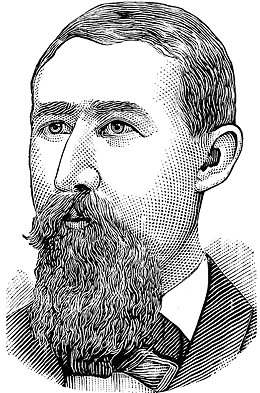
Joseph Mulhattan
During the 1870s and 1880s Joseph Mulhattan was perhaps the most famous hoaxer in America. He was a traveling salesman, not a reporter, but he was notorious for repeatedly succeeding in having his farfetched tales reported as news. If an outrageous or bizarre story appeared in the papers, reporters would often assume it was the work of Mulhattan.
The media showered him with epithets. They called him a "professional liar," "the author of more hoaxes than any other man living," "Munchausen Mulhattan," and the "liar-laureate of the world." He was also widely known by his pseudonym, "Orange Blossom."
Although Mulhattan is now an obscure figure, his hoaxes seem more relevant than ever because of the proliferation of fake news on the Internet — a medium, one imagines, that he would have definitely taken to were he still alive. Many of his tales could probably still fool people if they showed up on Facebook or Twitter. Like much of the fake news that circulates online, his stories weren't particularly funny or satirical, but they were attention-grabbing!
However, there's one big difference between Mulhattan and the modern purveyors of fake news. The stories that clutter Facebook and Twitter are created in order to make money through ad revenue. But Mulhattan made nothing from his tales. He concocted them purely for the thrill of deceiving the media. He would send his stories to newspaper offices, and editors would usually accept them without question. Many editors probably realized the stories were false, but printed them anyway, knowing that they were amusing and would boost circulation. An article about Mulhattan in the Syracuse
Sunday Herald (Dec. 1900) stated, "He never made a cent by his lies and in ordinary business affairs he spoke the truth, but he had a mania for giving misinformation to the newspaper and indulged himself in the mania to the injury of his other business."
Despite the remark about his hoaxes causing injury to his business, the opposite is probably true. His fame as a hoaxer seems to have aided his career as a salesman, because it gave him the reputation of being a man who could convince anyone of anything.
Mulhattan himself claimed his hoaxes were a journalistic innovation, which he called "novelistic journalism." He compared planting a false story in a newspaper to writing a novel in 1000 words — but he boasted that his "novels" were read by a million people ten hours after he had written them. He said in an 1883 interview, "Nobody is hurt by my little novels; nobody's morals are corrupted, and all are entertained and sometimes instructed."
Variant spellings of his name appear, including Mulhatten, Mulhatton, and Mulholland. Curtis MacDougall, author of the 1940 book
Hoaxes, referred to him as "Mulholland." However, sources from the late nineteenth century most consistently wrote his last name as "Mulhattan."
During the early 1880s a reporter provided this description of his physical appearance:
The famous prevaricator is a rather small man, good-looking, with beard and mustache, dancing blue eyes, quick cat-like motions, and one of the most rapid talkers one could find in a day's walk. The words seem to be gurgling in his throat and chasing each other out, hot-foot. He dresses very well, and altogether presents a very tidy appearance.
Biography
Mulhattan was the son of a Presbyterian minister. According to the 1880 Jefferson County census, he was born in a small town outside of Pittsburgh, Pennsylvania in 1853. (A biographical sketch of him written in 1888 lists the date of his birth as 1845, but this is almost certainly wrong.) Reportedly his first hoax involved a fictitious account of a stage coach being held up. Over the course of the next week, he spread rumors about other stage coaches being held up. Reporters from Pittsburgh, convinced a crime wave was occurring, poured into the area, "after riding some fifty miles over the mountains in buck boards," only to discover they had been had.
After graduating from high school, Mulhattan left the Pittsburgh area and became a highly successful traveling salesman (also known as a commercial drummer). He traveled the country, representing businesses such as the Kentucky Jeans Company, W.B. Belknap & Co., Hart and Company, and Rankins-Snyder Hardware company of Louisville. However, even as his business career flourished, he continued his side career as a hoaxer.
While his first hoax was not particularly inventive, his later efforts showed greater ingenuity. In 1877 he penned a story claiming that the body of George Washington had been discovered to be petrified, and that it would be placed on display. In 1878, after moving to Kentucky, he wrote about the discovery of an enormous, fourteen-mile-long cave in Glasgow Junction, through which a wide river flowed. An entrepreneur was said to be constructing a steamboat to offer underground rides along this river. In 1880 he authored an April Fool's Day story about a young girl who tied a large number of toy balloons around her waist and consequently floated away. But his most notorious tale was the report of a giant meteor, ten-acres wide, that had fallen to the earth outside of a town in Texas.
Presidential Nomination
In 1884 the Drummers National Convention nominated Mulhattan for President of the United States. In an interview, Mulhattan suggested his campaign would be aided by his fellow salesmen who could crisscross the country, making speeches on his behalf.
Although Mulhattan's nomination was doubtless meant to be tongue-in-cheek, his platform nevertheless seemed to be a serious reflection of the business interests of his colleagues. He proposed that, "business men shall prevent professional politicians and the lower classes from ruling the business interests of the country." He favored prohibition, on the grounds that "no drummer or business man can drink intoxicating liquors and be successful." He opposed convict labor, and proposed that the surplus in the treasury "be applied at once to liquidating the public debt and for public improvement."
Alcoholism
Despite Mulhattan's support of prohibition, he himself was a drinker. By the late 1880s his drinking had become a serious problem. In 1891 papers reported that he had been placed in a Chicago detention hospital for the insane. Mulhattan claimed he was suffering mental problems as a result of a head injury sustained by falling from a street car in New Orleans. However, it later was reported that the detention hospital was actually an Inebriate Asylum.
Two months later there were reports he had moved to Pittsburgh, where he was arrested for stealing money from a man he had met in a saloon. The papers reported that, "He denied taking the money, but the amount said to have been taken was found in his possession."
At around this time, Mulhattan published some "confessions," which were later quoted from in articles about his life. He wrote:
I cannot remember the first lie I ever told. Since the recent injury to my head by falling from a street car in New Orleans my memory has been seriously affected. Although my life has been at least as merry as that of the average member of my profession, it has been by no means an easy one. Care and years have left their marks, and I feel that for me the sands are almost run. Therefore I am sure the public, to whose amusement I have so long been an humble contributor, will indulge the modest pride I feel in the imperfect collection of the children of my brain.
During the 1890s, Mulhattan's health declined. In 1901 there were reports he was dying in Texas.
The Cambrian, a monthly magazine, proposed this epitaph for him:
Here lies what's left of liar Joe,
A truly gifted liar,
Who could outlie the liar below
In realms of flame fire.
He lied in life, in death he lies,
And if, his lies forgiven,
He made a landing in the skies,
He plays the lyre in heaven. |
Mulhattan survived, but his downward spiral continued. In December, 1902 a Louisville, Kentucky newspaper reported he had been found lying in the rain in front of the Falls City Hotel. At first it was thought he was dead, but it turned out he was drunk. In 1904 reports placed him in a San Francisco police station, awaiting trial for the theft of an overcoat. The reporter J.H. Raftery visited him in jail and wrote,
This outcast, ragged, stuttering, downcast man is the same Joseph Mulhattan who ten years ago was the richest, most popular, and best commercial traveler in the United States... The purple and fine linen of his heyday are changed to noisome rags. He sits on a rickety bench, his smeared face in his dirty hands, his bleary eyes staring at the mud daubed shoes in which he has been tramping the streets and alleys of San Francisco. His nose is red and shriveled, his face and body bloated, his limbs dwindled and shaky, his hands like talons.
Despite the bad condition he was in, Mulhattan continued to cling to life for a few more years. He reportedly died in Kelvin, Arkansas around 1914.
Hoaxes by or attributed to Mulhattan
We know of many of Mulhattan's hoaxes only through second or third-hand sources that often contain numerous inaccuracies. What follows is a list of some of his more famous hoaxes. Wherever possible, the information has been verified by reference to primary sources.
George Washington Petrified (1877)
One of Mulhattan's earliest hoaxes. His article stated that when Washington's tomb was opened for repairs, the official supervising the work discovered that the body of the former President had transformed into solid stone, and resembled a statue: "the features perfectly natural, with the exception of eyes and ears, no trace of which can be seen. The body is of a dark leathery color, and may be said to be soft sandstone, which would likely break should an attempt be made to remove it from the sarcophagus." See:
George Washington Petrified.
Grand Crystal Cave (1878)
Mulhattan moved from Pittsburgh to Kentucky in the late 1870s, and announced his arrival there by inventing a story about the discovery of a giant cave located near the town of Glasgow Junction. The cave had supposedly been explored for a distance of twenty-three miles underground, and three wide rivers flowed through it. Several mummified remains, similar to Egyptian mummies, had been discovered reposing in stone coffins. A local capitalist, J.R. Pucket, had announced his intention of offering steamboat rides on the underground river.
Carried Away By Balloons (1880)
Mulhattan's tale (which may have been intended as an April Fool's Day joke) involved a gentleman at the sea shore who gave a little girl a bundle of toy balloons. She tied the balloons around her waist, but a sudden gust of wind carried her away. She sailed out over the sand and would have been carried over the water if an old hunter, who happened to be present, hadn't shot the balloons one at a time, allowing her to gently descend to the ground, unhurt.
The Texas Meteor (1883)
One of Mulhattan's most notorious hoaxes was his report that a giant meteor had fallen in Texas, hitting William Ranch, in Brown County. It killed several head of cattle and completely destroyed the home of a Mexican herdsman, Martinez Garin. The meteor, still hot and steaming, was imbedded two hundred feet deep in the earth and towered seventy feet above ground. It was said to resemble the court house at Fort Worth. The Brown County postmaster reportedly received hundreds of telegrams from reporters around the world seeking more information.
Star of Bethlehem Discovered (1887)
Mulhattan claimed that a Kentucky astronomer, Professor Klein, had sighted the star of Bethlehem in the sky. He noted that the star of Bethlehem appeared about every 300 years, and that astronomers had been looking out for it for some time. Klein was, in reality, a Kentucky hardware salesman. Mulhattan's article angered real astronomers, some of whom (such as the English astronomer Richard Proctor) wrote in to newspapers to dispute his claims.
Monkeys Pick Hemp (1887)
In February, 1887, while living in Louisville, Mulhattan telegraphed a story to the
Kentucky Register alleging that a local farmer, J.B. Parkes, had trained monkeys to pick hemp. The story quickly disseminated around the country. The
New York Times printed an angry editorial denouncing Parkes's "scab monkeys," and warning that if other farmers imitated his example, honest laborers would soon be put out of work. Parkes, who was a real farmer, soon began receiving hate mail -- much to his surprise, since he had no trained monkeys, nor did he grow hemp. He pleaded with the
Kentucky Register to print a retraction, which they did, noting that he was a modest man who deserved to be left alone.
The Disappearance of David Lang
A tale that has circulated widely since the mid-twentieth century describes a Tennessee farmer, David Lang, who on September 23, 1880 supposedly vanished into thin air before a crowd of witnesses. One theory attributes this tale to Mulhattan, suggesting that he invented it for a lying contest while living in Tennessee. However, there is no evidence to suggest this is so. More likely, the story was invented by the novelist Stuart Palmer, since Palmer's version of the story in the July, 1953 edition of FATE Magazine is the earliest known published account of it. See:
The Disappearance of David Lang.
Links and References
- Raftery, J.H. "Too much a good fellow. Joe Mulhattan's sad fate." Chicago Tribune. Oct. 16, 1904.
- "Washington's Tomb." Chester Daily Times. March 16, 1877.
- "Mammoth Cave Outdone." McKean County Miner. July 11, 1878.
- "The Largest Meteor Ever Known Falls in Texas." The Decatur Daily Republican. April 16, 1883.
- "A Munchausen Journalist. The inventor of the Great Texas Meteor Story." The Decatur Saturday Herald. April 21, 1883.
- "Joe Mulhattan's Hoaxes." The Anaconda Standard. January 11, 1901.
- McQueen, Keven. (2001). Offbeat Kentuckians. McClanahan Publishing House. Kentucky.
- Herringshaw, Thomas W. (1888). Biographical Review of Prominent Men and Women of the Day. A.B. Gehman and Co. Chicago.
- Robert Grise. (Nov. 20, 2007). "Tale of the Parkes Monkey." Richmond Register.


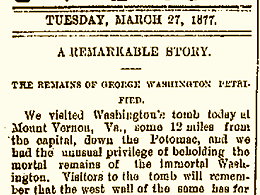
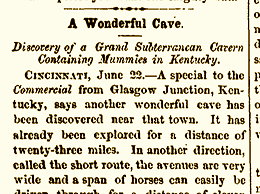
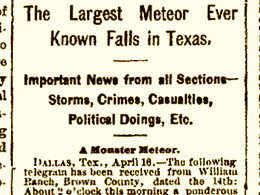
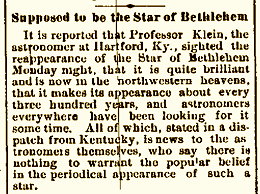
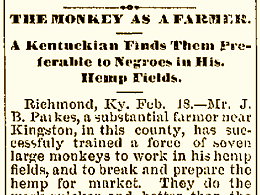
Hoaxes of Joseph Mulhattan